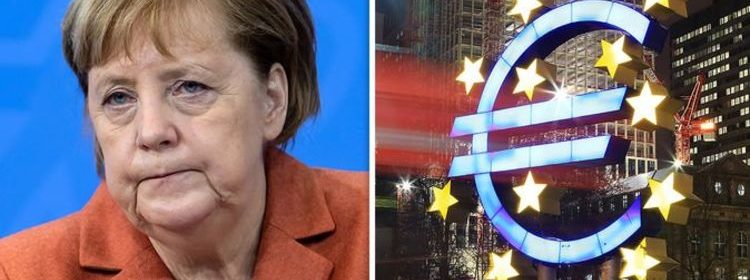Angela Merkel pinpointed ‘starting point’ for eurozone trouble in extraordinary confession

Eurozone: Varoufakis discusses the 'greatest beneficiary' in 2018
We use your sign-up to provide content in ways you’ve consented to and to improve our understanding of you. This may include adverts from us and 3rd parties based on our understanding. You can unsubscribe at any time. More info
Northern European countries often complain that southern eurozone economies are a burden on their tax systems, believing in the rhetoric that richer member states are paying more to save the rest of the bloc. However, Spanish economist Stuart Medina Miltimore, has recently argued it is southern EU countries like Italy, Spain and Greece that have kept the Brussels machine alive. Speaking to Express.co.uk, the founder of the Spanish Association Red MMT claimed the huge trade surpluses of states like Austria, Germany and the Netherlands, produced by their exports to Southern European countries, have been based on the debt the latter have been sustaining for years since joining the European Economic Community.
He explained: “In reality the net transfers from northern Europe to southern Europe are minuscule.
“In the end, they’re probably profiting a lot more in net exports to southern Europe.
“The price tag of their oversized, especially Germany’s, humongous trade surplus, is absolutely obscene – I think it’s almost eight percent of GDP in some years.
“Basically what the European Union has done is allow northern European countries to be able to capture markets, Italian markets, Spanish markets, Portuguese markets and Greek markets.”

Mr Miltimore’s comments are in stark contrast to what German Chancellor Angela Merkel believes.
In 2013, Mrs Merkel said Greece should never have been allowed into the euro and put the blame on former chancellor Gerhard Schroeder.
The German leader’s outburst came as she attempted to prove to voters she maintained a tough stance on struggling euro countries, just a month before facing key elections.
Mrs Merkel told around 1,000 supporters of her Christian Democratic Union in Rendsburg: “Greece shouldn’t have been allowed into the euro.
JUST IN: EU tipped for failure after statistic ‘proves Europe lives in past’


“Chancellor Schroeder accepted Greece in [in 2001] and weakened the Stability Pact, and both decisions were fundamentally wrong, and one of the starting points for our current troubles.”
Mrs Merkel reiterated her desire to see a strong single currency, but warned that it could have only been achieved through reforms in struggling countries such as Greece.
She added: “That [a unified euro area] is such a treasure, such a boon, that we can’t place it in doubt.
“That’s why the euro is more than a currency.
“For this reason we’ve shown solidarity, but solidarity is always linked to responsibility for reforms in those countries that experience our solidarity.
DON’T MISS:
EU snubbed painter for Parliament’s art collection: ‘Not symbolic!’ [INSIGHT]
Mervyn King’s gloomy eurozone warning: ‘A centralised elite!’ [REVEALED]
Sturgeon refused to rule out third independence vote if defeated [ANALYSIS]


Germany, a leading nation in the Greek bailouts, earned huge sums in interest payments after the financial crisis.
In 2010, eurozone countries bought €210billion (£180billion) of government paper, including Greek bonds, in order to provide greater liquidity to the EU’s banks as the Greek debt crisis unfolded.
According to figures obtained from Mrs Merkel’s government by Germany’s Green Party in 2018, Germany received €2.9billion (£2.5billion) in interest payments on Greek bonds that were bought through a now-defunct bond-buying programme.
Germany also received a total of €400million (£341million) on a loan from the KfW Development Bank.
The original agreement between Berlin and Athens was for any interest earned on the bonds to be paid back to Greece when it fulfilled its reform obligations.
However, Germany repaid €527million (£449million) of interest payments to Athens in 2013 and €387million (£330million) in 2014.
After Greece’s second bailout programme was agreed in 2015, those repayments stopped, and Berlin accumulated the ongoing interest.
Therefore, Germany is reportedly €2.5billion (£2.1billion) in profit, plus interest of €400million (£341million) on a loan from the KfW development bank.
Source: Read Full Article
